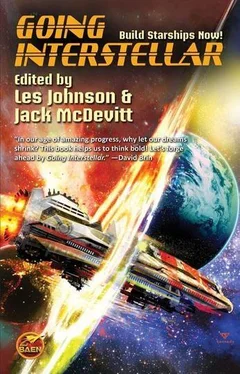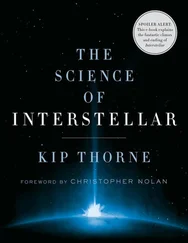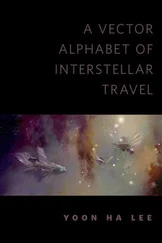The ship was quiet. The only sound Goss heard was his own breathing and the sloshing of the liquigel in which he found himself. As he pulled his naked form out of the tank, he realized that the liquigel had probably formed the basis for his swamp during the hibernation. Slowly and with great care, Goss sat up and put his feet on the floor. Mindful that he had probably been in suspended animation for perhaps hundreds of years, he wasn’t sure that his muscles and bones would be strong enough to sustain his weight in the simulated fifty percent Earth gravity in which he found himself.
He stood.
To his great relief, he found that the electrostimulation of his muscles and bones had kept them healthy and fully functional throughout his long sleep. Just as the electrostimulation had kept his body functioning, the virtual reality generator had kept his mind from atrophying. His “adventure” on the water world with the tower had been just that. A machine-induced training session to keep his mind functioning through the centuries required to cross the vast interstellar distances between Earth and the intended colony’s destination.
That means Julie and Charlie are not dead! Thank God. It was just a simulation. They were safely asleep onboard the New Madrid .
As he struggled to get his bearings, the weight of nearly a thousand years of dreaming came crushing down upon him. In his chosen artificial realities, he selected a succession of planetary exploration missions—all created by the ship’s Artificial Intelligence to help train him for any eventuality he might encounter in the real world. Before awakening, he realized, he must have visited hundreds, if not thousands, of new worlds—all different, and all created by a computer simulation program.
But this was real and it wasn’t as it was supposed to be. Where was Commander Vasquez? Where were the med techs? Anything could happen upon revival and it was not protocol for it to happen like this.
He moved to the side of the room and opened his locker. Inside, and as perfectly preserved as he, were his clothes. Thanks to vacuum storage, they looked and felt as fresh as the day he took them off and put them there—so very long ago.
How long have I been asleep? Where are we? He had more questions than answers.
After cleaning off the gel and getting dressed, he ventured out of the sleep chamber and into the hallway that led to the ship’s control room. He thought that Vasquez must be there, supervising the orbital encounter with Epsilon Eridani Four, the destination world that the telescopes back on Earth had found to contain an atmosphere suitable for Earth-based life.
During the latter half of the twenty-first century, more and more planets had been found orbiting other stars. Not only were they pinpointed and their masses estimated, but large telescopes optimized to look for certain chemical signatures determined that some of the newly found planets had atmospheres, and that at least two of the nearest worlds harbored atmospheres in which humans could live without wearing masks or other protective clothing.
These were “Goldilocks worlds,” so-called because they were neither too hot (like Venus) nor too cold (like Mars); they had atmospheres with enough, but not too much, oxygen; they were “just right” for sustaining life. It was toward the second of these worlds that the New Madrid was sent with colonists who would settle there and build a new home for humanity.
Goss had volunteered for the journey. He was fed up with the crowded cities of Earth and found the Moon and Mars colonies, with their cramped below-ground living areas, simply too dark and unforgiving for his tastes. The idea of being a pioneer, of having the chance to build a new world or die trying, was just the sort of challenge for which he had longed his entire life.
Are we there yet? If not, then why was I awakened? He tried to keep these thoughts at bay as he walked down the long, curved corridor toward the control room.
Midway there, he stopped to look out one of the windows that the engineers had been so loath to include. Dangerous, they’d argued. Maybe so, but the view was worth it. Before him was the majesty of the New Madrid ; home to thousands of colonists eager for a new beginning. He gazed back along the hull at the central core of the starship, which housed its antimatter power plant and propulsion system as well as many of the supplies they would need once their new home was reached. His eyes drifted out from the core along one of the many half-kilometer-long spokes that supported the habitation ring in which he had spent who knows how many years in hibernation.
Without a decent fixed reference point, it was virtually impossible to discern that the ring was completing one rotation every minute—though he felt the comfortable one-half gravity acceleration caused by the slow spin as he walked through the ship. Humans evolved in a one gravity environment on Earth but scientists had determined that only half that was needed to maintain their health in deep space. And since one can’t tell the difference between acceleration caused by gravity and acceleration caused by spinning, the engineers had found a way to provide the “gravity” people needed to keep them healthy in deep space—spin the ship.
He continued past the window and down the corridor toward the control room. There, he opened the door, expecting to be greeted by Commander Vasquez’s booming voice. Instead, there was only silence and the steady hum of the circulation system keeping the breathable air moving throughout the ship.
The room was empty.
The commander’s chair was vacant as were the duty stations for the ship’s command crew. The room seemed somehow unreal to Goss. It isn’t supposed to be like this.
He entered, approached the commander’s chair and sat in it, pulling the console on the mechanical arm forward so he could see what it had to say. One word was flashing on the display panel as he pulled it into view.
ALERT
Recalling his training, Goss activated the ship’s Artificial Intelligence by speaking the command phrase, “Command Authorization Substitute Five Zero Three.”
“Five Zero Three recognized,” came the reply from the ship’s speaker system.
Goss was relieved to hear the AI’s voice. Maybe now he could find out what was going on.
The AI was programmed with a voice that sounded, except for its rather stilted diction, completely human. Studies had shown that people reacted more favorably if the computer at least sounded human. Gone were the monotone computer-generated voices that had preceded it.
“Five Zero Three, do you require a status?” asked the AI program, following procedure.
“Yes, please provide our location, navigation history, and overall ship status.”
A holographic projection appeared above the navigation console in the middle of the room. At the center was Sol, the Earth’s star, and around it were the nearest star systems stretching out to a distance of about fifteen light years. As Goss watched, a curving line appeared, slowly being drawn from Sol outward to Epsilon Eridani, their primary destination. But instead of stopping there, the line curved by the star system and toward another—Tau Ceti. Again, it didn’t end there but curved yet again toward another star, Epsilon Indi, and then stopped one quarter of the way toward it.
The AI spoke, “After finding the primary and secondary star systems unsuitable, Commander Vasquez ordered that we continue toward Epsilon Indi. I awakened you, Mr. Goss, because we encountered a mission-changing event and Commander Vasquez and Deputy Commander Herndon are both dead.”
Goss’s mind was racing. How long had he been asleep? The antimatter drive of the New Madrid was to have made the voyage to Epsilon Eridani in nine hundred years.
Читать дальше












